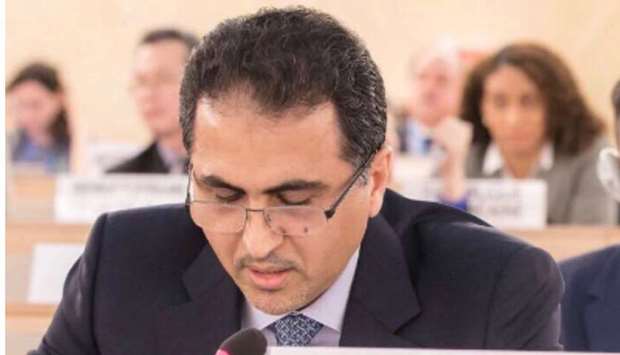Qatar has stressed the importance of the Human Rights Council, and its relevant mechanisms, taking the necessary measures to stop racist discriminatory human rights violations by blockading countries, holding perpetrators accountable, compensating those affected, and ensuring that their recurrence is prevented.
This came in Qatar's statement, delivered by HE the Permanent Representative of the State of Qatar to the United Nations in Geneva, ambassador Ali Khalfan al-Mansouri during the general debate under the ninth item of the agenda of the 43rd session of the Human Rights Council under the title racism, racial discrimination, xenophobia, and related intolerance, follow-up to and implementation of the Durban Declaration and Programme of Action.
HE al-Mansouri clarified that this month marks three years since the racist discriminatory measures taken by the blockading countries against Qatar and its citizens, the effects of which are still found in numerous, systematic, and continuous violations of human rights, as more than 4,000 complaints of gross violations of more than 12 basic human rights have been received since the beginning of the unjust blockade.
These violations and measures target the affected people based on their affiliation with Qatar, which is discrimination based on nationality, national origin and a direct violation of the provisions of the International Convention on the Elimination of All Forms of Racial Discrimination (ICERD), he said.
HE al-Mansouri stated that the joint families whose members were separated due to the violation of the right to freedom of movement and residence, bear the brunt of these violations, which have left a severe psychological impact on them and caused social difficulties that are difficult to correct.
He pointed out that these violations affected other basic rights, such as the right to education, ownership, health, freedom of opinion and expression, and the practice of religious rites.
At a time when the world is undergoing many international challenges, the latest of which is the coronavirus (Covid-19), and the need for co-operation and the prevalence of wisdom, racist and discriminatory practices arise to ravage human principles and the values of freedom, justice, and equality, he added.
HE al-Mansouri pointed out that experience has demonstrated that racist and discriminatory practices that are the source of government decisions represent the worst forms of racism because they become part of the policies implemented by official agencies by the force of law, and there is no way to resist them through national legal systems, which results in the absence of accountability, the promotion of a culture of impunity from punishment, and undermining the rule of law.
HE al-Mansouri added that due to the absence of national accountability in the blockading countries for the violations that resulted from it, which contributed to wasting the rights of victims to litigate and seek compensation, Qatar resorted to international fair mechanisms such as the Committee on the Elimination of Racial Discrimination, which issued two decisions accepting the jurisdiction to consider complaints submitted by Qatar against Saudi Arabia and the UAE, and the International Court of Justice, which issued interim orders that include a moratorium on some human rights violations committed by the UAE in the context of this crisis.
HE al-Mansouri clarified that this month marks three years since the racist discriminatory measures taken by the blockading countries against Qatar and its citizens, the effects of which are still found in numerous, systematic, and continuous violations of human rights, as more than 4,000 complaints of gross violations of more than 12 basic human rights have been received since the beginning of the unjust blockade.
These violations and measures target the affected people based on their affiliation with Qatar, which is discrimination based on nationality, national origin and a direct violation of the provisions of the International Convention on the Elimination of All Forms of Racial Discrimination (ICERD), he said.
HE al-Mansouri stated that the joint families whose members were separated due to the violation of the right to freedom of movement and residence, bear the brunt of these violations, which have left a severe psychological impact on them and caused social difficulties that are difficult to correct.
He pointed out that these violations affected other basic rights, such as the right to education, ownership, health, freedom of opinion and expression, and the practice of religious rites.
At a time when the world is undergoing many international challenges, the latest of which is the coronavirus (Covid-19), and the need for co-operation and the prevalence of wisdom, racist and discriminatory practices arise to ravage human principles and the values of freedom, justice, and equality, he added.
HE al-Mansouri pointed out that experience has demonstrated that racist and discriminatory practices that are the source of government decisions represent the worst forms of racism because they become part of the policies implemented by official agencies by the force of law, and there is no way to resist them through national legal systems, which results in the absence of accountability, the promotion of a culture of impunity from punishment, and undermining the rule of law.
HE al-Mansouri added that due to the absence of national accountability in the blockading countries for the violations that resulted from it, which contributed to wasting the rights of victims to litigate and seek compensation, Qatar resorted to international fair mechanisms such as the Committee on the Elimination of Racial Discrimination, which issued two decisions accepting the jurisdiction to consider complaints submitted by Qatar against Saudi Arabia and the UAE, and the International Court of Justice, which issued interim orders that include a moratorium on some human rights violations committed by the UAE in the context of this crisis.



